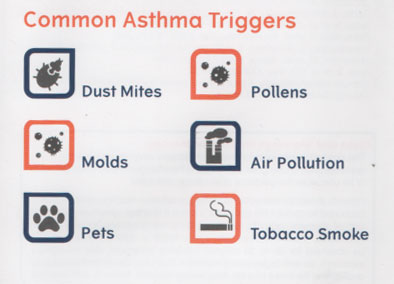Your Allergies and Asthma

Up to 80% of Asthmatic Patients also have Allergic Rhinitis

Allergy symptoms have been shown to be major risk factors for the development of asthma.
Asthma is currently diagnosed in about 8% of the population and consistently higher in children.
Recognition of asthma symptoms or the warning signs of later asthma symptoms may be difficult and are frequently missed.
Medical costs for asthma are approximately $30 billion per year in the US.
Common Asthma Triggers

Connecting Allergy & Asthma
The presence of allergens in your environment may cause an asthma attack. Research has shown that allergy and asthma are closely related diseases. This is thought to be all parts of the airway are connected. What causes problems in one part of the airway, such as the nose, may have a direct impact on other parts, such as the lungs.
When diagnosing allergy, it is important that your doctor evaluate your lung function for signs of developing asthma. Like wise, when diagnosing asthma, it is important that your doctor move beyond the lungs and evaluate your allergy symptoms. The best treatment addresses both conditions to improve the overall health of your airway.
Indoor Allergy = Constant Allergy
Continuous exposure to common indoor allergens, such as dust mite, may lead to constant inflammation, or swelling, in the airway. This constant swelling in the airway may make your asthma symptoms worse. While seasonal allergens, such as pollen, may have less of an overall impact since their exposure usually lasts for shorter periods of time.
Am I Really Fine?
With constant exposure to indoor allergens, airway inflammation may be present without any perceived symptoms. Research shows that physical allergy signs, such as inflammation of the nose, were found in many asthma patients who reported having no allergy symptoms.
This could be a problem because both allergy and asthma required long term treatment. When patients think they are getting better they often stop taking their medications. This may lead to the worsening of symptoms over time.
It has been found patients with poorly controlled allergy symptoms have more severe asthma attacks which may get worse over time. In general, the more persistent and intense your allergy symptom, the more likely asthma will develop, or get worse. This is especially true of children.
If you’re an asthma patient that requires daily medication, you might consider being evaluated for allergy. By diagnosing and treating your allergies early, you may remove a common trigger of asthma symptoms.